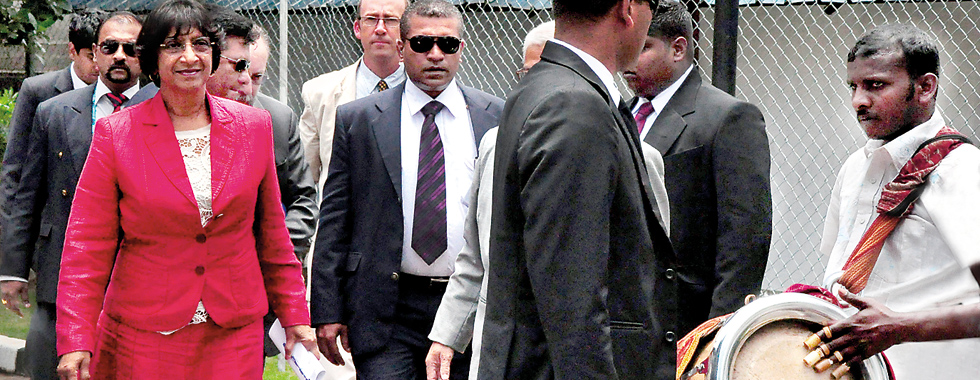News
Democracy undermined, rule of law eroded: Pillay
United Nations Human Rights Commissioner Navanethem Pillay warned yesterday that despite the opportunity provided by the end of the war to construct a new, vibrant, all-embracing State, Sri Lanka is “showing signs of heading in an increasingly authoritarian direction”. Ms. Pillay was addressing the media at the end of a seven-day fact-finding mission on the invitation of the Sri Lanka Government. She said a disturbing aspect of her visit was the harassment and intimidation of a number of human rights defenders, at least two priests, journalists, and many ordinary citizens who had met or had planned to meet her.

The United Nations Human Rights Commissioner Navanethem Pillay surrounded by security officers walking towards the National Youth Services Centre in Maharagama to address youths while a drummer plays a welcome beat amidst accusations she was dancing to the tune of the West. Pic by Mangala Weerasekera
“I have received reports that people in villages and settlements in the Mullaitivu area were visited by police or military officers both before and after I arrived there,” she said, reading out a detailed six-page statement. “In Trincomalee, several people I met were subsequently questioned about the content of our conversation.”
“This type of surveillance and harassment appears to be getting worse in Sri Lanka, which is a country where critical voices are quite often attacked or even permanently silenced,” Ms. Pillay said in her prepared statement. While this was utterly unacceptable at any time, it was particularly extraordinary for such treatment to be meted out during a visit by a UN High Commissioner for Human Rights, she said.
“That does not happen during my missions,” she said, during the question and answer session. “To me, this is just over the top here. And this is why I’m stressing that there should be freedom of speech and people should be able to express their concerns to an important visitor invited by the Government.”
She said that when she complained to the authorities about this, their reaction was denial. “So I’m rather hoping that they will look into it and investigate into these matters,” she told journalists. She said she would be reporting to the Human Rights Council about any reprisals that take place in connection with her visit.
The UN rights chief urged the Government to issue immediate orders to “halt this treatment of human rights defenders and journalists who face this kind of harassment and intimidation on a regular basis”. “With self-censorship fuelled by fear, journalists report that there are articles that they dare not write and others their editors dare not print,” she said. “Freedom of expression is under a sustained assault in Sri Lanka.”
“The war may have ended,” Ms. Pillay observed, “but in the meantime, democracy has been undermined and the rule of law eroded.”
Addressing the issue of war crimes allegations, the High Commissioner once again called for a credible investigation and urged Sri Lankans to “do it themselves”. But she warned that, if they failed to carry this out, calls for an international inquiry were likely to continue.
“My position is that I want to see the truth come out through a credible, independent investigation as well as action to hold anyone responsible for violations to account, and reparations for victims,” she said, responding to a question about international interference in domestic affairs.
The Lessons Learnt and Reconciliation Commission was never set up to be a full investigation while the Courts of Inquiry appointed by the Army did not have the transparency or the independence to be credible, she said. The Commission of Inquiry into Disappearances recently appointed by the Government was welcome. “But, unless there are more comprehensive efforts to uncover the truth, then the calls being made both inside this country, and outside, and by the international community… are likely to continue,” she noted. “And this is why I’m here, trying to offer my support for credible national investigations.”
The High Commissioner also pointed out that there was no protection for victims and witnesses to come forward and to testify, and for them to have some confidence in the process. Ms. Pillay also said she had assured Sri Lankans who had met her that the UN would keep watching developments here. “I’m quite overwhelmed when they said this visit is very important for them,” she remarked. “So I told them that we will keep the lens on Sri Lanka and help Sri Lanka in any way we can.”
The High Commissioner expressed concern to the Government about the “recent surge in incitement of hatred and violence against religious minorities, including attacks on churches and mosques, and the lack of swift action against the perpetrators”.
She said she was surprised that the Government had “seemed to downplay this issue”. Questioned further, Ms. Pillay disclosed that she was told by authorities that “it was just a single, isolated incident” but that there was “enough information pouring into my office which indicates otherwise”.
comments powered by Disqus
